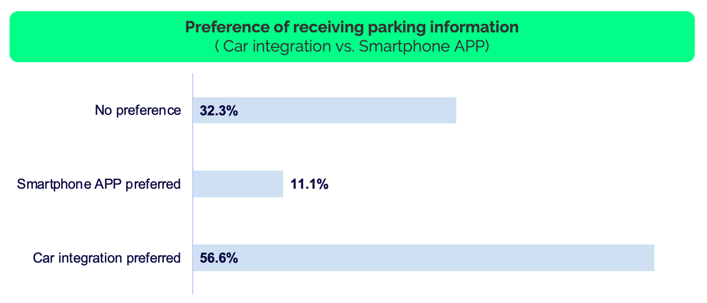Parking demand heavily outstrips supply in China, so it is no surprise that in-car parking tools have been eagerly adopted by the majority of drivers who now expect automakers to provide them with accurate parking information as an essential part of their connected vehicle services.
Last year, the total number of passenger cars in the country reached 281 million, while according to the National Development and Reform Commission, there are only approximately 80 million public spaces. The onus is now on the automaker to ensure the data they are providing is both accurate and reliable enough to enable a seamless customer parking experience and avoid driver frustration.
Research carried out earlier this year by Parkopedia and Zhongyan, where 1600 drivers were surveyed across China, found a high demand for vehicle-based parking tools, with 65% currently using their vehicles to find parking, and nearly half using the service more than x3 times a week. 57% also stated that they preferred to receive this information via their vehicle’s integrated system, compared to a mere 11% favouring smartphone applications, showing the demand for integrated systems that enable drivers to keep their attention on the road.
When we consider parking as a basic function for connected services, comprehensive, accurate and granular parking information is critical in order to ensure efficient usage of limited spaces, and to maintain a positive driver-centric experience.
The Problem
Accurate data can be hard to come by. Various smartphone application mapping providers claim to provide in-depth parking information from third parties, however, with limited and infrequent data testing, there is no way to guarantee accuracy.
Relying on facility providers for updates also comes with a high level of uncertainty, as due to the highly fragmented parking industry, any form of standardisation is seemingly impossible. Accurate static data can only be achieved if facilities update their information in a timely manner, while dynamic availability data is only possible with multiple sensors positioned around the facility, taking a constant count of vehicles entering and leaving the site or individual spaces. Many facilities take the easier option, and instead provide random occupancy data, placing their own convenience above quality.
The consequences of advising drivers based on poor quality data could be disastrous - leading to potentially frustrating situations for drivers, who could lose all trust in the service immediately.
The Solution
Parkopedia’s recent survey found that 77% of Chinese motorists want real-time, dynamic parking information embedded in the vehicle's head unit when approaching a destination or on departure. This is only possible with accurate data, sourced from reliable and trustworthy data providers.
Leading connected vehicle services provider, Parkopedia, performs regular Ground Truth Testing (GTT) in order to test the quality of its data when it comes to coverage, completeness and accuracy. GTT is an important tool for the automotive industry and mapping providers by helping them evaluate quality amongst data providers and provide effective services to drivers.
GTT exposes the level of correctness and accuracy across both static and dynamic attributes by visiting multiple locations and comparing the information available from the data provider with the information available at the locations. While this process may seem simplistic, evaluating Point of Interest (POI) data is a complex process that requires planning to give a consistent and fair evaluation between competing suppliers. The planning process should consider the following: areas where parking is most in-demand and where drivers would benefit the most from a parking information service, the type of parking at the location such as on-street or off-street parking, and any weighting of attributes, such as factors that would have a high to low impact on customer satisfaction.
A thorough understanding of the data is also key for a fair analysis. Publicly available data may not be an accurate representation, and global variations may cause confusion, such as if costs displayed are with or without tax added. Data suppliers should welcome fair evaluations to ensure automakers choose the most appropriate and highest quality data for their customers.
Parkopedia is able to provide external, expert-led GTT reports on request and encourages automakers to carry out their own testing, or ask their suppliers to, in order to best assess and compare data quality.
To read the complete 2021 China drivers survey, please click here or to request GTT reports, you can contact the team here.



